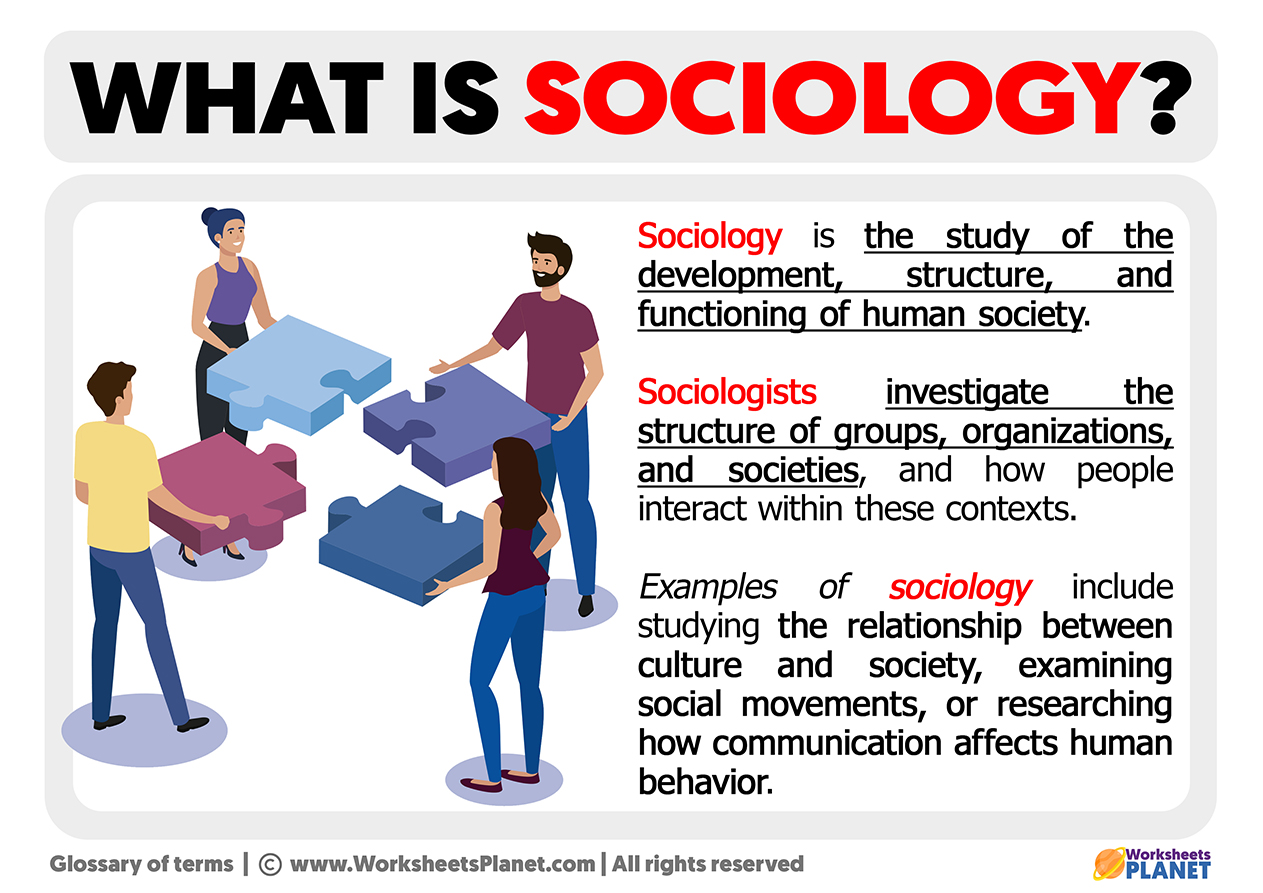Have you ever stopped to wonder why your neighbors choose to decorate their homes in a certain way, or why your friends prefer certain types of music? Perhaps you’ve been curious about the dynamics of your workplace or the way your family celebrates holidays. These everyday observations, seemingly mundane at first glance, are the very essence of sociology, a discipline that explores the intricate web of human relationships and the structures that shape our lives.

Image: www.worksheetsplanet.com
Sociology, more than just studying people, seeks to understand the patterns and forces that influence our behavior, beliefs, and social interactions. It dives into the complexities of our society, examining everything from the role of social institutions like family, education, and religion to the impact of globalization and technology on our lives.
The Foundations of Sociology: Unraveling the Human Experience
The roots of sociology can be traced back to the 18th and 19th centuries, a time of immense social and political upheaval. As societies transitioned from agrarian to industrial, thinkers like Auguste Comte, Karl Marx, and Emile Durkheim sought to understand the forces driving these changes and their impact on individuals. They laid the groundwork for the discipline, pioneering methods to analyze social phenomena and emphasizing the importance of examining social structures and institutions.
Key to sociology’s approach is the concept of the social construction of reality, which asserts that our understanding of the world is shaped by social interactions and cultural norms. This means that even seemingly “natural” phenomena like race, gender, and family structures are social constructs — categories created and maintained by our shared beliefs and values.
The study of sociology offers a powerful lens through which we can deconstruct social phenomena that we often take for granted. It helps us understand:
- Social Inequality: Why do some groups in society experience more privilege and opportunity than others? Sociology delves into issues like race, class, and gender to shed light on the systemic inequalities that permeate our world.
- Social Change: How do societies evolve over time? Sociology examines the dynamics of social movements, political revolutions, and cultural shifts, providing insights into the forces that drive change.
- Culture and Identity: How do cultural norms, beliefs, and values shape our individual and collective identities? Sociology explores the diverse cultural practices, rituals, and beliefs that give meaning to our lives.
Modern Sociology: Navigating the Complexities of the 21st Century
While its roots are firmly planted in the past, sociology is a dynamic discipline that continues to evolve and adapt to the complexities of the modern world. Emerging trends and pressing issues demand new perspectives and approaches:
- Globalization and Cultural Diversity: As interconnectedness increases, sociologists are exploring the impact of globalization on national identities, cultural exchange, and social movements.
- Technology and Social Media: The rise of the internet and social media has irrevocably transformed our communication patterns, social interactions, and political landscapes. Sociology seeks to understand how these technologies are shaping our experiences and reshaping our understanding of community.
- Climate Change and Environmental Justice: Facing the growing threat of climate change, sociologists are examining its unequal impacts on different communities, its influence on social movements, and the challenges of finding sustainable solutions.
Beyond the Classroom: Applying Sociological Insights to Everyday Life
The knowledge gained through sociological study isn’t confined to textbooks and academic journals. It has the power to empower us and equip us to navigate the complexities of our social world. Here are some ways you can apply sociological insights to your own life:
- Critical Thinking: Examining social issues from a sociological perspective encourages you to challenge assumptions, question established norms, and consider multiple perspectives. This critical thinking can help you make more informed decisions and engage in meaningful conversations about social change.
- Understanding Diversity: By delving into different cultures, social groups, and identities, you can learn to appreciate the rich tapestry of human experience and foster empathy for others. This understanding can lead to more inclusive and equitable interactions.
- Informed Action: Using sociological analysis, you can identify patterns of inequality and injustice, allowing you to participate in social movements or support organizations tackling these issues. Your informed action can contribute to positive social change.

Image: www.youtube.com
Sociology More
The Future of Sociology: A Call to Action
As we move forward into an increasingly interconnected and complex world, sociology remains a crucial discipline for understanding, navigating, and shaping our collective future. It illuminates the intricate web of relationships that bind us together, empowering us to build more equitable, just, and sustainable societies for all. By embracing the principles of sociological inquiry, we can contribute to a world where every individual has the opportunity to thrive.
Take the first step on your sociological journey. Explore the wealth of resources available online, through books, and in your local community. Engage in critical discussions with friends and family, challenging assumptions and fostering understanding. And most importantly, utilize your newfound knowledge to advocate for positive change in your own sphere of influence. Remember, sociology isn’t just a subject, it’s a way of thinking and living that can empower you to make a real difference in the world.






